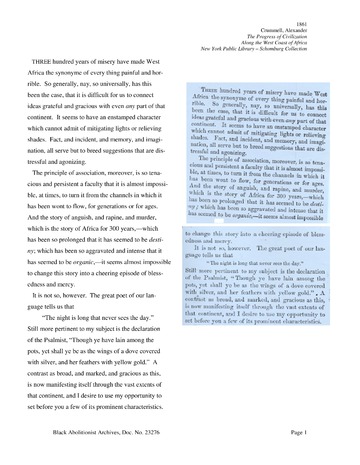
Speaker or author: Crummell, Alexander, 1819-1898
Newspaper or publication: New York Public Library -- Schomburg Collection
Speech emphasizing the benefits of colonization in Africa. The speaker listed each benefit and positive feature of Africa in a very rational and pragmatic way emphasizing trade, economics, education and Christian missionary work that have improved the colonized areas.
Description of file(s): PDF 25 page, 6,423 word document (text and images)
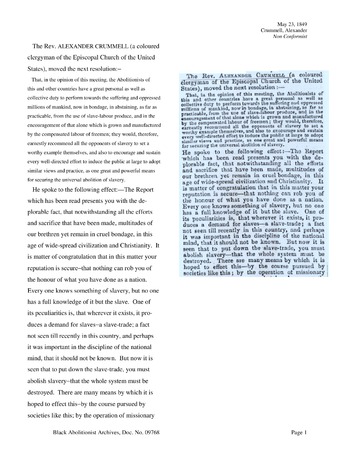
Speaker or author: Crummell, Alexander, 1819-1898
Newspaper or publication: Non Conformist
Brief speech regarding the effect the American cotton growers and their slave labor have on the world economy. The speaker called for Britain to stop buying and using products produced with slave labor. (Speech 09789 is a duplicate of this speech.)
Description of file(s): PDF 3 page, 614 word document (text and images)
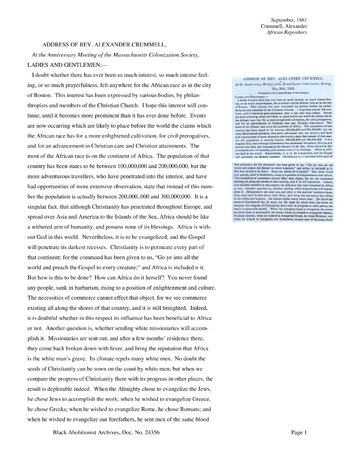
Speaker or author: Crummell, Alexander, 1819-1898
Newspaper or publication: African Repository
Lengthy speech describing the current conditions in Africa, the new colony in Monrovia and in Liberia. The speaker emphasized the abundance of natural resources, the stability of the freedom based government, and the availability of education to everyone. (Speech 24099 is a duplicate of this speech. Speech 24140 offers another version of this speech.)
Description of file(s): PDF 13 page, 5,852 word document (text and images)
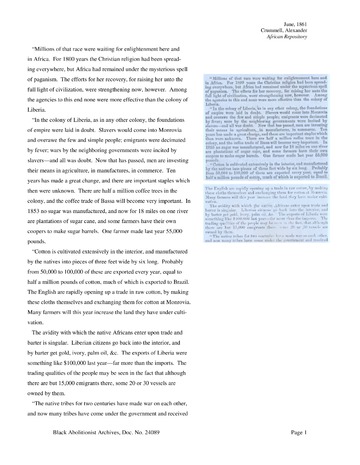
Speaker or author: Crummell, Alexander, 1819-1898
Newspaper or publication: African Repository
The speaker stressed the benefits of immigration to Liberia by free African Americans. He emphasized the potential for riches, quality education, and peaceful freedom that were available in Liberia.
Description of file(s): PDF 2 page, 550 word document (text and images)
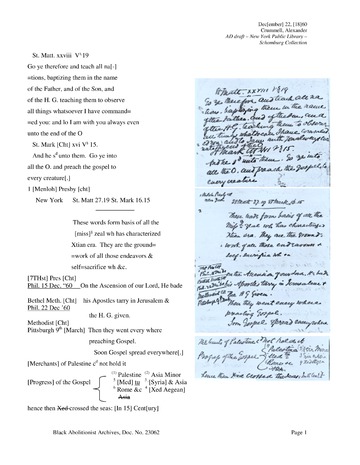
Speaker or author: Crummell, Alexander, 1819-1898
Newspaper or publication: AD Draft -- New York Public Library -- Schomburg Collection
-- Copyright Permission Granted September 2007 -- Handwritten notes for speech regarding the speaker's idea that the colonization of Africa is part of God's plan. The speaker emphasized the potential for a quality life there doing God's work.
Description of file(s): PDF 8 page, 1,412 word document (text and images)
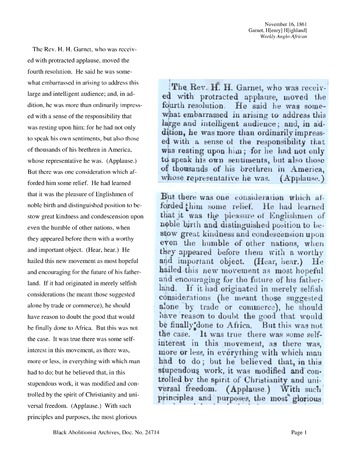
Speaker or author: Garnet, Henry Highland, 1815-1882
Newspaper or publication: Weekly Anglo-African (1859 - 1862)
The speaker approves of the civilization goals of the African Aid Society that proposes to move black families from Canada to Africa. He believes this offers a postive way to improve the lives of all concerned, and provide England with a different source for cotton. Like many abolitionists, he believes that slavery is mainly continued in the U.S. based on the money made from the production of cotton.
Description of file(s): PDF 6 page, 1,360 word document (text and images)
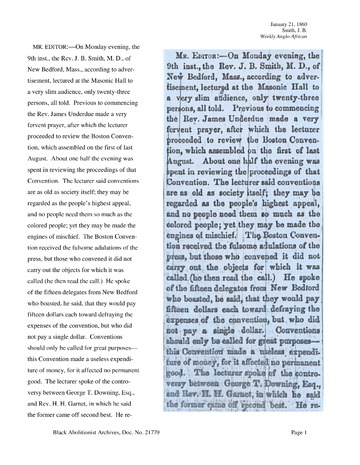
Speaker or author: Smith, J. B. (John B.), Rev., fl. 1852-1863
Newspaper or publication: Weekly Anglo-African (1859 - 1862)
The speaker gave a brief overview of the Boston Convention including a "controversy" between Henry Highland Garnet and George T. Downing. He said that the convention participants had agreed that they would remain in the U.S., their birth place. He also stressed the importance of cotton in continuing the system of slavery.
Description of file(s): PDF 3 page, 532 word document (text and images)
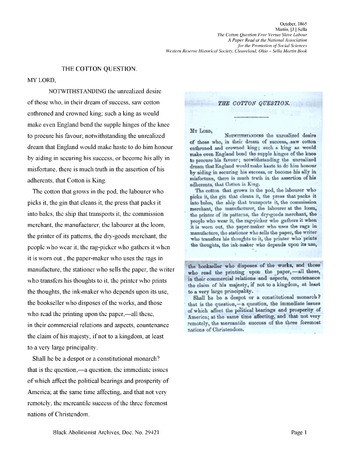
Speaker or author: Martin, J. Sella (John Sella), b. 1832
Newspaper or publication: Western Reserve Historical Society, Cleveland Ohio -- Sella Martin Book
The speaker traced in detail the benefits and the drawbacks of raising cotton. He stressed the value of the crop itself and its positive influence on the American economy. He linked this with the work of slaves who had given their health and lives to produce it. The remainder of the speech stressed the predicament that the emancipation of the slaves placed on those involved with cotton production. He also emphasized that the Negro was not inferior to the white race and he offered several examples to prove this. He believed the future of the production of cotton and other crops was with science not with "brute" man power. The idea of inferiority of one race was not a sound argument for slavery. He argued for the right of all human beings to be free.
Description of file(s): PDF 13 page, 3,682 word document (text and images)
spe.pdf.jpg)
Speaker or author: Martin, J. Sella (John Sella), b. 1832
Newspaper or publication: Liberator
Brief speech in which the speaker defended the African civilization project. He believed that immigrating to Africa, growing cotton there, then selling cotton to England was one of the best way to end slavery in the U.S.
Description of file(s): PDF 1 page, 191 word document (text and image)
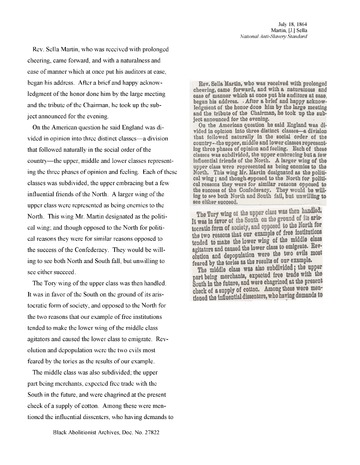
Speaker or author: Martin, J. Sella (John Sella), b. 1832
Newspaper or publication: National Anti-Slavery Standard
The speaker put forward his assessment of how the situation in the U. S. is currently viewed in England. He noted that opinion differs by class and political affiliation with some siding with the Union and some with the Confederacy. He gave examples and detailed his reasoning when reaching these conclusions.
Description of file(s): PDF 3 page, 628 word document (text and images)
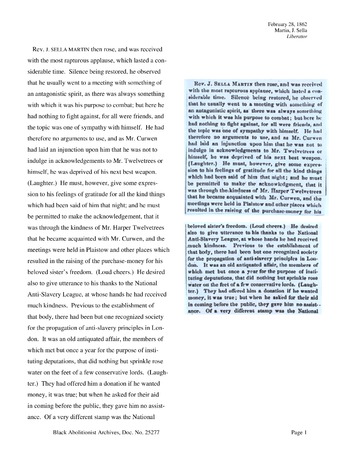
Speaker or author: Martin, J. Sella (John Sella), b. 1832
Newspaper or publication: Liberator
Speech delivered before an English audience recognizing the efforts of the National Anti-Slavery League and its members in the fight for universal abolition of slavery.
Description of file(s): PDF 4 page, 949 word document (text and images)
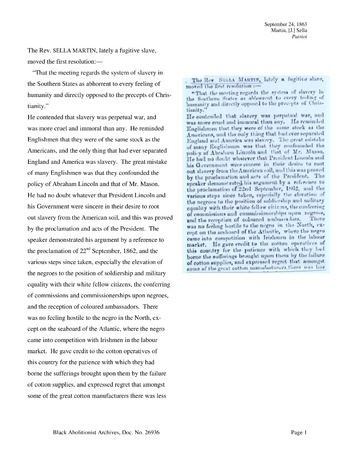
Speaker or author: Martin, J. Sella (John Sella), b. 1832
Newspaper or publication: Patriot
Speech delivered before an English audience regarding the effects of the Civil War on the English economy. The speaker emphasized that slavery was "perpetual war, and was more cruel and immoral than any." He apologized to the British people for the disruption in cotton importation from the U.S. due to the fighting.
Description of file(s): PDF 3 page, 651 word document (text and images)
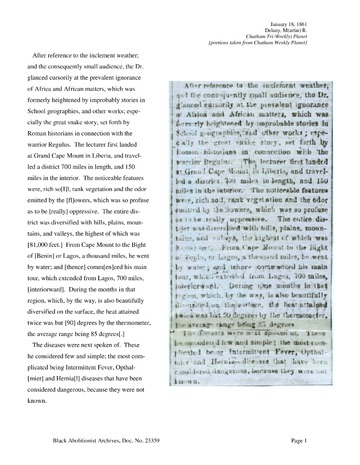
Speaker or author: Delany, Martin Robison, 1812-1885
Newspaper or publication: Chatham Tri-Weekly Planet (with portions taken from the Chatham Weekly Planet)
The speaker gave an account of his recent explorations in Liberia including geological and geographical information. He also stressed the kindness, curiosity and willingness to learn of the people he encountered in Africa.
Description of file(s): PDF 3 page, 630 word document (text and images)
spe.pdf.jpg)
Speaker or author: Delany, Martin Robison, 1812-1885
Newspaper or publication: Leeds Mercury
Overview of a speech delivered when responding to a question regarding his motivation for exploring Africa. The speaker said he was searching for a suitable place for the immigration of free African Americans.
Description of file(s): PDF 1 page, 496 word document (text and image)
(page1).jpg.jpg)
Title: Provincial Freeman - July 1, 1854
Speaker or author: editor
Newspaper or publication: Provincial Freeman (1853 - 1859)
The writer expresses his opinion of a circular he received calling for people of African descent living in Canada to work in the British West Indies. He believes this is another immigration scheme created by those who suppose these people are not smart enough to stay where they are.
Description of file(s): four scanned, two columned, newspaper pages
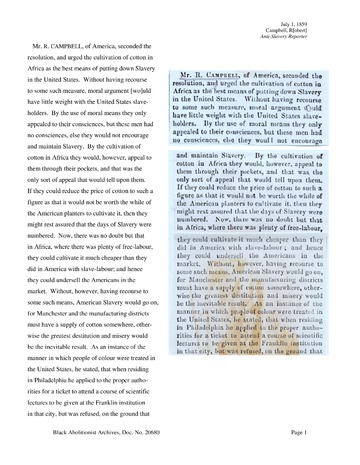
Speaker or author: Campbell, Robert
Newspaper or publication: Anti-Slavery Reporter
The speaker suggested that the best way to end slavery was to cultivate cotton in Africa. He believed that if European countries could purchase cotton from Africa and refuse to buy from slaveholding countries. This would eliminate the main reason for slavery in the U.S.
Description of file(s): PDF 2 page, 314 word document (text and images)
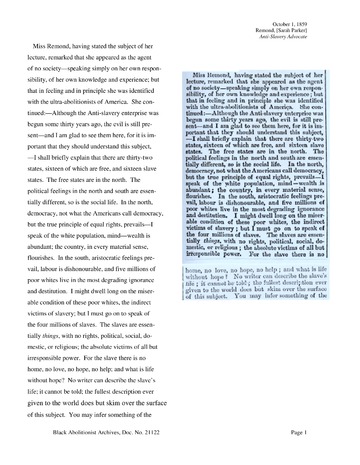
Speaker or author: Remond, Sarah Parker, 1826-1887?
Newspaper or publication: Anti-Slavery Advocate
Impassioned speech describing the horrors of slavery. The speaker stressed that the economics of the cotton industry was continuing the institution of slavery. She also emphasized the influence of the Church in continuing slavery by condoning it.
Description of file(s): PDF 4 page, 1,158 word document (text and images)
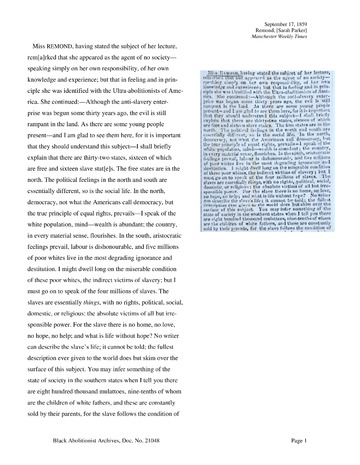
Speaker or author: Remond, Sarah Parker, 1826-1887?
Newspaper or publication: Manchester Weekly Times
Impassioned speech delivered before an English audience. The speaker recounted examples of the horrors and moral degradation of slavery. She noted that the economics of cotton ruled the mind and morals of slaveholders. She stressed that slavery had not only denied freedom to millions of human beings, but had created a population of poor white people who could not earn a livable wage due to its existence.
Description of file(s): PDF 9 page, 2,862 word document (text and images)
(page1).jpg.jpg)
Title: Voice of the Fugitive - December 17, 1851
Speaker or author: editor
Newspaper or publication: Voice of the Fugitive (1851 - 1852)
In order to undermine slavery, the writer suggests going elsewhere for goods like cotton, sugar, coffee, indigo and rice -- the mainstays of the southern economy under slave power. He suggests the Canadian market as the best resource for these products.
Description of file(s): two scanned newspaper pages (three columns)
(page1).jpg.jpg)
Title: Voice of the Fugitive - December 3, 1851
Speaker or author: editor
Newspaper or publication: Voice of the Fugitive (1851 - 1852)
The writer responds to an article published in a southern newspaper that encourages the southern states to unite to prevent the abolition of slavery.
Description of file(s): two scanned newspaper pages (three columns)
(page1).jpg.jpg)
Title: Voice of the Fugitive - July 30, 1851
Speaker or author: editor
Newspaper or publication: Voice of the Fugitive (1851 - 1852)
With the introduction of Chevalier Claussen's new cotton processing for flax, the writer sees an opportunity for northern free labor (in terms of agricultural endeavors) to compete with southern cotton growers and finally put an end to the system of slavery.
Description of file(s): two scanned newspaper pages (three columns)
(page1).jpg.jpg)
Title: Voice of the Fugitive - November 19, 1851
Speaker or author: editor
Newspaper or publication: Voice of the Fugitive (1851 - 1852)
The writer discusses immigration to Canada and the British West Indies by African Americans. He examines this subject from five perspectives: "commercial, agricultural, social, mental, and political."
Description of file(s): two scanned, two columned, newspaper pages
(page1).jpg.jpg)
Title: Weekly Anglo-African - April 5, 1862
Speaker or author: editor
Newspaper or publication: Weekly Anglo-African (1859 - 1862)
The writer points to several social and political events that signal the end of slavery. With the end of the war, emancipation must be included in the peace and change that follows.
Description of file(s): two scanned, two columned, newspaper pages
(page1).jpg.jpg)
Title: Weekly Anglo-African - April 6, 1861
Speaker or author: editor
Newspaper or publication: Weekly Anglo-African (1859 - 1862)
Slave labor would not be necessary if not for the production of cotton, one of the most important products in the civilized world at this point. The threat of abolishing slavery, is perceived as including a threat of losing the cotton supply for many countries. The solution expressed by the writer is to create a system of free labor for the production of cotton. This will benefit not only the economic growth of the country but an entire race of people as well.
Description of file(s): four scanned newspaper pages (seven columns)
(page1).jpg.jpg)
Title: Weekly Anglo-African - December 22, 1860
Speaker or author: editor
Newspaper or publication: Weekly Anglo-African (1859 - 1862)
The writer comments on the current political focus on secession, and the growing tension between the northern and southern states.
Description of file(s): one scanned, two columned, newspaper page



